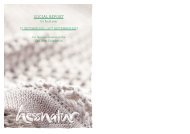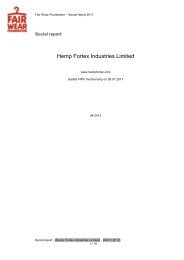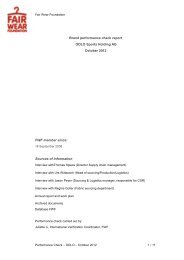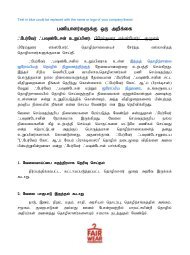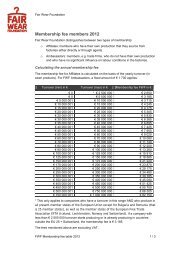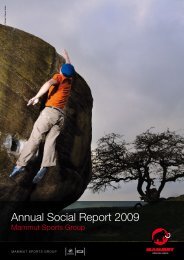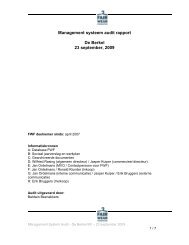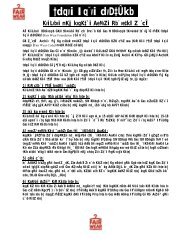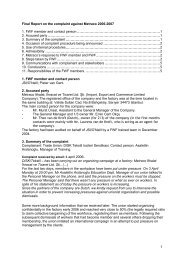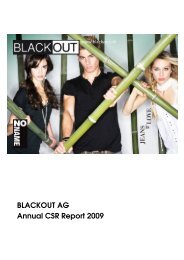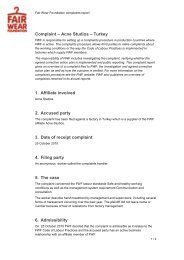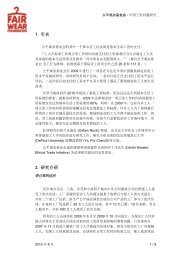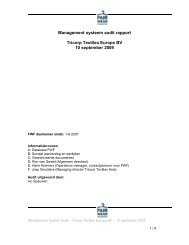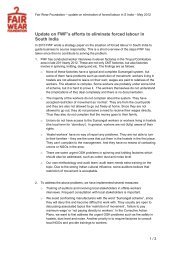Kwintet (Far East) Limited - Fair Wear Foundation
Kwintet (Far East) Limited - Fair Wear Foundation
Kwintet (Far East) Limited - Fair Wear Foundation
You also want an ePaper? Increase the reach of your titles
YUMPU automatically turns print PDFs into web optimized ePapers that Google loves.
Social report 2009<br />
<strong>Kwintet</strong> <strong>Far</strong> <strong>East</strong> Ltd.<br />
(KFE) - the Group’s<br />
sourcing organisation<br />
in Asia<br />
www.kwintet.com<br />
Start date membership:<br />
January 2009<br />
Organisation chart:<br />
<strong>Kwintet</strong> AB<br />
Wenaas Fristads & Co Indiform & Co<br />
Social report - [<strong>Kwintet</strong> <strong>Far</strong> <strong>East</strong> Ltd.] – [February 2010]<br />
1/ 16<br />
B&C Cotton Group
Social report 2009<br />
Contents<br />
Contents.............................................................................................................................. 2<br />
1. Summary: goals & achievements 2009 ....................................................................... 3<br />
2. Sourcing strategy......................................................................................................... 6<br />
2.1. Sourcing strategy & pricing .................................................................................. 6<br />
2.2. Production cycle................................................................................................... 7<br />
2.3. Selection of new factories.................................................................................... 7<br />
2.4. Integration monitoring activities and sourcing decisions.................................... 8<br />
3. Coherent system for monitoring and remediation ..................................................... 9<br />
3.1. Countries from where KFE sources...................................................................... 9<br />
3.2. External production............................................................................................ 15<br />
4. Training and capacity building................................................................................... 15<br />
4.1. Activities to inform staff members .................................................................... 15<br />
4.2. Activities to inform agents ................................................................................. 16<br />
4.3. Activities to inform manufacturers and workers............................................... 16<br />
5. Transparency & communication ............................................................................... 16<br />
Social report - [<strong>Kwintet</strong> <strong>Far</strong> <strong>East</strong> Ltd.] – [February 2010]<br />
2/ 16
Social report 2009<br />
1. Summary: goals & achievements 2009<br />
This Social Report applies to <strong>Kwintet</strong> <strong>Far</strong> <strong>East</strong> Ltd. (hereby referred to as KFE), <strong>Kwintet</strong><br />
Group’s sourcing hub in Asia, with its offices located in Hong Kong and Ningbo, China.<br />
The <strong>Kwintet</strong> Group is a group of companies that supply high-quality professional wear<br />
for all purposes and industries. The products of <strong>Kwintet</strong> business entities range from<br />
heavy work wear (such as used at oil-rigs, uniforms for heat protection etc.) to light<br />
garments such as t-shirts, professional suits and uniforms, protective equipment, shoes<br />
and gloves.<br />
Historically, each business entity of the <strong>Kwintet</strong> group has operated as an independent<br />
entity with its own supply base and its own set of policies related to environmental and<br />
social performance. However, in 2006 the <strong>Kwintet</strong> group initiated a process to carefully<br />
consolidate, and integrate, the supply base of the independent <strong>Kwintet</strong> entities under a<br />
common umbrella organisation for strategic sourcing.<br />
The process of developing the sourcing organisation and consolidating group<br />
procurement is still ongoing. Since <strong>Kwintet</strong>’s central sourcing organisation in Asia,<br />
<strong>Kwintet</strong> <strong>Far</strong> <strong>East</strong> Ltd. (KFE) joined FWF and submitted its Work Plan for 2009, <strong>Kwintet</strong><br />
Group has reconstructed its sourcing organisation and developed a Preferred supplier<br />
program (see more below in section 2). Right now <strong>Kwintet</strong> <strong>Far</strong> <strong>East</strong> (KFE) accounts for<br />
most of the Asian sourcing within the group, and at least for all the Preferred suppliers<br />
located in Asia. The total number of Preferred suppliers is approximately around 130,<br />
out of which KFE handles around 80 %.<br />
Therefore, in the first phase the FWF membership applies only to KFE and thereby 77<br />
suppliers in total, with 172 production units in use for <strong>Kwintet</strong> production. Gradually<br />
<strong>Kwintet</strong> will apply for membership for other business units in the group, depending on<br />
how far they have come in their sourcing consolidation process. The target is that all of<br />
<strong>Kwintet</strong> Group shall be a member of FWF by the end of 2011, and that the total number<br />
of suppliers will be in the range of 450 suppliers by the end of 2013, sourcing to at least<br />
90 % from the Preferred suppliers.<br />
Social report - [<strong>Kwintet</strong> <strong>Far</strong> <strong>East</strong> Ltd.] – [February 2010]<br />
3/ 16
Social report 2009<br />
<strong>Kwintet</strong>’s business entity KLM Kleding, part of the Wenaas division, is a FWF member<br />
since 2003, with six of its suppliers representing approximately 95 % of their turnover.<br />
Since five out of these six suppliers are KFE suppliers, they are included in the KFE Work<br />
Plan for 2009. A separate Work Plan has been submitted for KLM Kleding’s supplier<br />
Nedanco in Tunisia.<br />
<strong>Kwintet</strong> <strong>Far</strong> <strong>East</strong> Ltd. (KFE) signed its membership contract with FWF in December 2008.<br />
This was an active step forward in the outlined framework for <strong>Kwintet</strong> Group’s social<br />
compliance program, embracing KFE, its sourcing hub in Asia. <strong>Kwintet</strong>’s Code of Conduct<br />
is based on the Code of Labour Practice, and the group’s social compliance program is<br />
developed in line with FWF guidelines for affiliate members. Although <strong>Kwintet</strong> started<br />
by enrolling only KFE as members of FWF, the Code of Conduct and the social<br />
compliance program applies to all of <strong>Kwintet</strong> Group and its total supply base. In the<br />
wake of signing the membership contract for KFE, the year of 2009 followed with<br />
implementation of the outlined activities in practice. In summary, we reached the<br />
following achievements during 2009:<br />
• We developed a compliance monitoring and remediation program including<br />
audit form and audit procedure, compliance violation matrix and business<br />
consequence matrix, as well as an approach to start by auditing the suppliers<br />
that are the most important to the sourcing department, i.e. prioritized in<br />
company spend. The program has gradually been elaborated to fit <strong>Kwintet</strong><br />
Group’s new strategic sourcing program (see below in section 2.1)<br />
• All KFE suppliers have received the <strong>Kwintet</strong> Code of Conduct and been requested<br />
to sign it as a minimum requirement for being a business partner of <strong>Kwintet</strong>.<br />
Regular follow-up via phone and e-mail has been carried out during the year to<br />
ensure that the Code is signed. By end February 2010, 95 % of the KFE suppliers<br />
have signed the document. Furthermore, in November 2009 the Preferred<br />
suppliers were gathered in a workshop in Shanghai to get an introduction to<br />
<strong>Kwintet</strong>’s new strategic sourcing organisation, including a session on the social<br />
compliance program and background to KFE’s membership in FWF.<br />
Social report - [<strong>Kwintet</strong> <strong>Far</strong> <strong>East</strong> Ltd.] – [February 2010]<br />
4/ 16
Social report 2009<br />
• All KFE suppliers have received a <strong>Kwintet</strong> Compliance Manual which serves as a<br />
handbook that offers guidance on how the supplier can be proactive and ensure<br />
compliance with our Code of Conduct.<br />
• Target of 40 % of KFE suppliers audited has been reached, in the sense that the<br />
percentage covers the spend/turnover per supplier. However, during 2009 it has<br />
not been possible to track the spend/turnover down to factory level, which is<br />
why the 40 % indicates the supplier’s total spend/turnover. In other words, not<br />
necessarily all of a supplier’s production units have been audited during 2009;<br />
audits have been booked at the factories most important to KFE sourcing<br />
regarding product development, quality etc. During 2010 our internal financial<br />
system will gradually be able to track turnover to factory level. In total, 37<br />
factories out of 172 were audited in 2009. Our contracted audit agency partner<br />
Omega Compliance conducted the audits with focus on suppliers located in<br />
China, India, Bangladesh, Pakistan, South Korea and Vietnam.<br />
• Information about <strong>Kwintet</strong> Group’s compliance program and KFE’s membership<br />
in FWF is published on the company intranet (KWintranet) under a separate CSR<br />
section, which is visible in the first page and continuously updated with material<br />
and information concerning the social compliance program. Information is also<br />
available on <strong>Kwintet</strong>’s web site, under a particular CSR section from where the<br />
Code of Conduct can be downloaded.<br />
• The Chinese poster versions of the Code of Labour Practice, i.e. pages 6-7 of<br />
<strong>Kwintet</strong>’s Code of Conduct plus the local complaints procedure, has been printed<br />
and distributed to the suppliers in China for display on the factory floors. The<br />
Vietnamese and Hindi versions are yet to be distributed to the suppliers in<br />
Vietnam and India. During 2010 we will continue to distribute the poster with<br />
complaints procedure to the remaining markets where KFE is operating.<br />
• We have initiated the recruitment of an in-house auditor at KFE office in Hong<br />
Kong who, parallel to the contracted external compliance audit agency, will<br />
conduct factory audits and eventually place particular focus on the monitoring<br />
Social report - [<strong>Kwintet</strong> <strong>Far</strong> <strong>East</strong> Ltd.] – [February 2010]<br />
5/ 16
Social report 2009<br />
and follow-up of suppliers’ remediation and corrective actions. The recruitment<br />
is to be completed within the first quarter of 2010.<br />
2. Sourcing strategy<br />
2.1. Sourcing strategy & pricing<br />
As stated earlier, the sourcing procedures for <strong>Kwintet</strong> Group are in a process of<br />
fundamental consolidation. When KFE joined FWF the ambition was primarily to<br />
significantly reduce the number of suppliers in our supply base, to in turn reduce the<br />
amount of CMT sourcing in favour FOB sourcing, and to move production from Europe<br />
to Asia. Since early fall 2009 a new sourcing organisation has been created along with a<br />
Preferred supplier program, in order to promote strong and long-term business<br />
relationships, improved efficiency, as well as better saving and purchasing terms. On an<br />
average, the duration of business relation with suppliers is approximately two years for<br />
each contract period.<br />
The consolidated sourcing strategy of a Preferred supplier program which <strong>Kwintet</strong><br />
Group is embarking on outlines three different supplier categories – Strategic, Tactical<br />
and Complementary – as a part of the Group’s future sourcing approach, where the<br />
total supply base shall be around 450 suppliers by 2013.<br />
The term ‘Preferred suppliers’ refers to both Strategic and Tactical suppliers. We have a<br />
well defined supplier rating system to manage the suppliers and how they perform in<br />
the fields of product development excellence, innovation, product solutions, fulfilling<br />
customer and <strong>Kwintet</strong> requirements, total cost effectiveness, superior supplier rating,<br />
logistics and supply chain requirements. Prices are negotiated based on full total cost<br />
including raw material, production and inbound freight and duties. Total factories<br />
sourced from in Asia are more or less 100 % aligned with sourcing via KFE.<br />
Organization of the sourcing department<br />
We have a global sourcing team working in close coordination with the business entities,<br />
with teams in Europe and Asia working together to ensure that we reach the annually<br />
set key performance indicators.<br />
Social report - [<strong>Kwintet</strong> <strong>Far</strong> <strong>East</strong> Ltd.] – [February 2010]<br />
6/ 16
Social report 2009<br />
We work predominantly directly with manufacturers; only a limited portion of our<br />
sourcing goes via agents. From a social compliance perspective, all production units in<br />
use by agencies, intermediaries and suppliers for <strong>Kwintet</strong> production must be declared<br />
to us via a production unit register which must be filled out by all direct product<br />
suppliers. The agents must sign our Code of Conduct to ensure that all the factories that<br />
they assign for <strong>Kwintet</strong> production meet our compliance requirements. Once a factory<br />
assigned by an agent has been audited, the agents are involved in the remediation<br />
process by receiving the Corrective Action Plan and helping CSR Department and<br />
sourcing department with monitoring of the corrections of the non-compliance findings.<br />
2.2. Production cycle<br />
The large majority of <strong>Kwintet</strong>’s items are long running articles. We also do bespoke<br />
collections that can be a one-off collection or longer running items. In addition, we<br />
produce a few seasonal collections. In general the lead time for raw material is 8-12<br />
weeks, while for ready made garments it is around 4-6 weeks.<br />
2.3. Selection of new factories<br />
An initial technical inspection is performed at KFE suppliers by our quality team or by<br />
the regional sourcing manager. Although the factory number turnover is low in general,<br />
new factories are sometimes added to the sourcing base. Updates are reflected in the<br />
Supplier Register submitted to FWF at the time of each Annual Work Plan.<br />
In the past, we have often used external social compliance audits such as Intertek and<br />
Bureau Veritas to inspect the factory. Nowadays the pre-assessment questionnaire<br />
includes a compliance section, which all potential new suppliers have to fill out. Quality<br />
Manager or merchandising team at KFE also checks the status of basic social compliance<br />
level (core ILO conventions and no hazardous work environment) and reports it to the<br />
Regional Compliance Manager at KFE. Once the factory is considered basic level<br />
compliant according to the pre-assessment results and the sourcing department has<br />
confirmed the intention to use the factory, an initial social compliance audit is booked<br />
with contracted agency (Omega Compliance) and the supplier gets to sign the <strong>Kwintet</strong><br />
Code of Conduct. The supplier also receives a Compliance Manual, which describes how<br />
the production units can work proactively to be compliant with the Code. No orders may<br />
be placed with a potential new supplier unless it passes the minimum requirements in<br />
Social report - [<strong>Kwintet</strong> <strong>Far</strong> <strong>East</strong> Ltd.] – [February 2010]<br />
7/ 16
Social report 2009<br />
the Code of Conduct at the initial audit, and the findings listed in Corrective Action Plan<br />
within stipulated timeframe have been corrected.<br />
2.4. Integration monitoring activities and sourcing decisions<br />
KFE is using a supplier rating system which, in the trails of the new Group strategic<br />
sourcing organization, evolved into the rating system described above in section 2.1.<br />
One of the basic requirements in the Preferred supplier criteria is that the supplier must<br />
sign the Code of Conduct alongside <strong>Kwintet</strong>’s Restricted Substances List. As Preferred<br />
suppliers are audited, the compliance related criteria for them to remain Preferred is<br />
that they meet the minimum compliance level stipulated in the Code of Conduct and<br />
move towards the best audit grading score.<br />
As <strong>Kwintet</strong> Group has such a large supply chain to onboard to its compliance program,<br />
the Group became a member of Sedex – Supplier Ethical Data Exchange – in the<br />
beginning of 2009. One of the initial steps in <strong>Kwintet</strong>’s compliance program is to require<br />
all <strong>Kwintet</strong> Complementary suppliers to conduct the Sedex online Compliance Self-<br />
Assessment for each production unit used for <strong>Kwintet</strong> production. Together with<br />
sourcing importance, risk level of product category and risk level of geographical<br />
location, the Sedex self-assessment results form the base for audit planning. Unless KFE<br />
suppliers are of Complementary status they have not been pushed to complete the selfassessment<br />
as they have been prioritized for audit booking anyways, booking based on<br />
the remaining planning criteria.<br />
When a factory is audited, the results and findings lead to an overall compliance grading<br />
of the audited production unit. The grading consists of a colour scale where Red labels<br />
all non-compliance findings that are below minimum requirements in the Code (such as<br />
forced labour, discrimination, missing fire exits etc.), Green equals to full compliance,<br />
and Orange and Yellow are grading of the non-compliance findings in between. During<br />
2009 we have developed a routine of business consequences based on the audit<br />
grading, but it has not yet been systematically implemented. A significant part of the<br />
explanation is that the new sourcing organisation has been under construction and we<br />
are still in the final stages of establishing a standard communication channel between<br />
CSR Department and Category Management teams. KFE has developed a supplier<br />
compliance database within its Navision system, and the aim is that category managers<br />
Social report - [<strong>Kwintet</strong> <strong>Far</strong> <strong>East</strong> Ltd.] – [February 2010]<br />
8/ 16
Social report 2009<br />
shall have viewer’s access to the latest compliance status of individual suppliers with the<br />
help of the database. The principles of the business consequences are:<br />
a) a more flexible approach towards existing suppliers in order to give them time to<br />
correct compliance violations. Existing Preferred suppliers are shown more<br />
flexibility than existing Complementary suppliers.<br />
b) a more stringent approach to any potential new suppliers which will not be<br />
considered for order placement if the audit prior to production shows a<br />
compliance level below our minimum requirements<br />
c) to remain in business with a supplier to the greatest extent rather than phase<br />
them out whenever compliance violations are identified. Phase-out of a KFE<br />
supplier for compliance reasons has not happened yet, but such a process is set<br />
in motion if a supplier shows lack of cooperation or no progress on Corrective<br />
Action Plan. We are yet to set the phase-out criteria and communicate it to the<br />
Group’s sourcing teams.<br />
3. Coherent system for monitoring and remediation<br />
3.1. Countries from where KFE sources<br />
The outcome of our monitoring activities is described per country below:<br />
China<br />
a) (If the factory has been visited and by whom)<br />
Factories are regularly visited by the sourcing team or QC staff<br />
b) (Whether during the factory visit there has been discussion of code<br />
implementation, informing staff, upcoming or past audits, progress of corrective<br />
action plans etc.)<br />
Depending on the purpose of the visit, compliance is discussed upon the<br />
occasion.<br />
Social report - [<strong>Kwintet</strong> <strong>Far</strong> <strong>East</strong> Ltd.] – [February 2010]<br />
9/ 16
Social report 2009<br />
c) (If any complaints have been filed and how these were handled)<br />
None<br />
d) (Cooperation with other clients, for example on complaints or corrective actions)<br />
None<br />
e) (If the factory has been audited)<br />
18 out of 123 factories in China were audited during 2009, equal to 37 % of total<br />
spend/FOB. Three factories, i.e. 17 % of total audited factories in the country,<br />
were graded Yellow and thus audit outcomes are not listed here. The most<br />
common audit findings were:<br />
- Fire services equipment inadequacy<br />
- Payroll record inadequacy<br />
- Time record inadequacy<br />
- Inadequate personal protective equipment/machine safety measures<br />
- Certificate inadequacy (health and safety related)<br />
- Excessive deduction / workers' benefit inadequacy<br />
- Age documentation / working permit of young workers inadequacy<br />
- Chemical labeling/documentation inadequacy<br />
- First aid inadequacy<br />
- Minimum / overtime wage inadequacy<br />
f) (If there is a Corrective Action Plan and what corrective actions that have been<br />
taken).<br />
Corrective Action Plan has been set upon each audit and corrections are<br />
executed within stipulated timeframes.<br />
g) (Any other monitoring activities, e.g. factory training).<br />
None<br />
India<br />
Social report - [<strong>Kwintet</strong> <strong>Far</strong> <strong>East</strong> Ltd.] – [February 2010]<br />
10/ 16
Social report 2009<br />
a) (If the factory has been visited and by whom)<br />
Factories are regularly visited by the sourcing team or QC staff<br />
b) (Whether during the factory visit there has been discussion of code<br />
implementation, informing staff, upcoming or past audits, progress of corrective<br />
action plans etc.)<br />
Depending on the purpose of the visit, compliance is discussed upon the<br />
occasion.<br />
c) (If any complaints have been filed and how these were handled)<br />
None<br />
d) (Cooperation with other clients, for example on complaints or corrective actions)<br />
None<br />
e) (If the factory has been audited)<br />
5 out of 13 factories in India were audited, equal to 12 % of total spend/FOB. The<br />
most common audit findings were:<br />
- Fire services equipment inadequacy<br />
- Payroll record inadequacy<br />
- Social insurance inadequacy<br />
- Minimum / overtime wage inadequacy<br />
- Excessive deduction / workers' benefit inadequacy<br />
- Time record inadequacy<br />
- Inadequate personal protective equipment / machine safety measures<br />
- Terms of hiring inadequacy<br />
f) (If there is a Corrective Action Plan and what corrective actions have been taken)<br />
Corrective Action Plan has been set upon each audit and corrections are<br />
executed within stipulated timeframes.<br />
g) (Any other monitoring activities, e.g. factory training)<br />
None<br />
Social report - [<strong>Kwintet</strong> <strong>Far</strong> <strong>East</strong> Ltd.] – [February 2010]<br />
11/ 16
Social report 2009<br />
Bangladesh<br />
a) (If the factory has been visited and by whom)<br />
Factories are regularly visited by the sourcing team or QC staff<br />
b) (Whether during the factory visit there has been discussion of code<br />
implementation, informing staff, upcoming or past audits, progress of corrective<br />
action plans etc.)<br />
Depending on the purpose of the visit, compliance is discussed upon the<br />
occasion.<br />
c) (If any complaints have been filed and how these were handled)<br />
None<br />
d) (Cooperation with other clients, for example on complaints or corrective actions)<br />
None<br />
e) (If the factory has been audited)<br />
4 out of 13 factories in Bangladesh were audited, equal to less than 1 % of total<br />
spend/FOB. The most common audit findings were:<br />
- Age documentation / working permit of young workers inadequacy<br />
- Payroll record inadequacy<br />
- Time record inadequacy<br />
- First aid inadequacy<br />
- Substandard sanitary condition<br />
- Inadequate personal protective equipment / machine safety measures<br />
- Escape route inadequacy<br />
- Fire services equipment inadequacy<br />
- Chemical labeling / documentation inadequacy<br />
- Excessive deduction / workers' benefit inadequacy<br />
Social report - [<strong>Kwintet</strong> <strong>Far</strong> <strong>East</strong> Ltd.] – [February 2010]<br />
12/ 16
Social report 2009<br />
f) (If there is a Corrective Action Plan and what corrective actions have been taken)<br />
Corrective Action Plan has been set upon each audit and corrections are<br />
executed within stipulated timeframes.<br />
g) (Any other monitoring activities, e.g. factory training)<br />
None<br />
Vietnam<br />
a) (If the factory has been visited and by whom)<br />
Factories are regularly visited by the sourcing team or QC staff<br />
b) (Whether during the factory visit there has been discussion of code<br />
implementation, informing staff, upcoming or past audits, progress of corrective<br />
action plans etc.)<br />
Depending on the purpose of the visit, compliance is discussed upon the<br />
occasion.<br />
c) (If any complaints have been filed and how these were handled)<br />
An ex-employee of a Vietnamese supplier filed a complaint on one occasion, and<br />
an audit followed to verify this complaint. Part of the allegation was proved valid<br />
during the audit. The supplier was requested to establish remediation, which<br />
<strong>Kwintet</strong> CSR department followed up. Then a re-audit was scheduled to verify<br />
the correction progress. The audit results have been communicated to the<br />
person who filed the complaint.<br />
d) (Cooperation with other clients, for example on complaints or corrective actions)<br />
None<br />
e) (If the factory has been audited)<br />
7 out of 10 factories in Vietnam were audited, equal to 10 % of total spend/FOB.<br />
The most common audit findings were:<br />
- Payroll record inadequacy<br />
- Age documentation / working permit of young workers inadequacy<br />
- Time record inadequacy<br />
Social report - [<strong>Kwintet</strong> <strong>Far</strong> <strong>East</strong> Ltd.] – [February 2010]<br />
13/ 16
Social report 2009<br />
- First aid inadequacy<br />
- Escape route inadequacy<br />
- Fire services equipment inadequacy<br />
- Excessive deduction / workers' benefit inadequacy<br />
f) (If there is a Corrective Action Plan and what corrective actions have been taken)<br />
Corrective Action Plan has been set upon each audit and corrections are<br />
executed within stipulated timeframes.<br />
g) (Any other monitoring activities, e.g. factory training)<br />
None<br />
Other countries<br />
a) Other countries that KFE sources from are Korea, Laos, Malaysia, Pakistan,<br />
Thailand and UAE, where the total numbers of factories are 11. Out of these, 4<br />
factories were audited.<br />
b) (If the factory has been visited and by whom)<br />
Factories are regularly visited by the sourcing team or QC staff<br />
c) (Whether during the factory visit there has been discussion of code<br />
implementation, informing staff, upcoming or past audits, progress of corrective<br />
action plans etc.)<br />
Depending on the purpose of the visit, compliance is discussed upon the<br />
occasion.<br />
d) (If any complaints have been filed and how these were handled)<br />
None<br />
e) (Cooperation with other clients, for example on complaints or corrective actions)<br />
None<br />
f) (If the factory has been audited)<br />
4 out of 11 factories in the above mentioned countries were audited – 3 in<br />
Pakistan and 1 in Laos – equal to 13 % of total spend/FOB. The most common<br />
audit findings were:<br />
Social report - [<strong>Kwintet</strong> <strong>Far</strong> <strong>East</strong> Ltd.] – [February 2010]<br />
14/ 16
Social report 2009<br />
- Fire services equipment inadequacy<br />
- First aid inadequacy<br />
- Inadequate personal protective equipment / machine safety measures<br />
g) (If there is a Corrective Action Plan and what corrective actions have been taken)<br />
Corrective Action Plan has been set upon each audit and corrections are<br />
executed within stipulated timeframes.<br />
h) (Any other monitoring activities, e.g. factory training)<br />
None<br />
3.2. External production<br />
During 2009 KFE has not been handling any suppliers of "external production". Although<br />
a significant number of the Preferred suppliers happen to be of external production,<br />
they are handled primarily by the Category Managers located in Europe. <strong>Kwintet</strong>’s CSR<br />
Department requires that Preferred suppliers with external production signs the an<br />
appendix which stipulates that the supplier must endorse the Code of Labour Practice,<br />
and that instead of having its production sites audited the supplier shall declare to us its<br />
own compliance program. During 2010 the CSR Department will start requiring the data<br />
from Preferred suppliers of external production in line with the guidelines provided in<br />
FWF Manual for Affiliate Members section 3.2.2.<br />
4. Training and capacity building<br />
4.1. Activities to inform staff members<br />
Regional Compliance Manager at KFE has held a CSR seminar for the QC staff in Ningbo<br />
where the FWF membership has been explained. <strong>Kwintet</strong> Group has published<br />
information about KFE’s FWF membership on the company intranet (KWintranet).<br />
Regular informal communication has been held with the Group’s business entities’<br />
selected CSR contact persons whom are in charge of getting the suppliers to sign the<br />
Code of Conduct (except for KFE suppliers which have been taken care of by KFE staff).<br />
During 2010 CSR workshops will be held at KFE’s offices, at individual business entities<br />
Social report - [<strong>Kwintet</strong> <strong>Far</strong> <strong>East</strong> Ltd.] – [February 2010]<br />
15/ 16
Social report 2009<br />
and for the CSR contact network which will serve as a kind of ambassadors for spreading<br />
awareness of CSR and the FWF program to the employees.<br />
4.2. Activities to inform agents<br />
See above in section 2.1.<br />
4.3. Activities to inform manufacturers and workers<br />
All KFE suppliers have received the <strong>Kwintet</strong> Code of Conduct and been requested to sign<br />
it as a minimum requirement for being a business partner of <strong>Kwintet</strong>. Regular follow-up<br />
via phone and e-mail is constantly carried out to ensure that the Code is signed.<br />
Furthermore, in November 2009 the Preferred suppliers were gathered in a workshop in<br />
Shanghai to get an introduction to <strong>Kwintet</strong>’s new strategic sourcing organisation,<br />
including a session on the social compliance program and background to KFE’s<br />
membership in FWF. All KFE suppliers have also received the <strong>Kwintet</strong> Compliance<br />
Manual, which serves as a handbook that offers guidance on how the supplier can be<br />
proactive and ensure compliance with our Code of Conduct.<br />
5. Transparency & communication<br />
Information about KFE’s membership in FWF and how it serves as a foundation for<br />
<strong>Kwintet</strong> Group’s total social compliance program, is published on the company web site.<br />
The business entities market and sales representatives are regularly encouraged to read<br />
about the FWF membership and forward the information to clients and customers in<br />
time for tenders. The Global Head of Environmental & Social Affairs has participated in<br />
client tenders on four occasions to inform about the compliance program and FWF. As<br />
we are yet in the stage of mapping out the compliance level at KFE suppliers as well as<br />
the rest of the Group’s supply chain we have concentrated the information focus to our<br />
overall compliance approach rather than to report on progress, which is yet to be made<br />
more visible first.<br />
Social report - [<strong>Kwintet</strong> <strong>Far</strong> <strong>East</strong> Ltd.] – [February 2010]<br />
16/ 16



